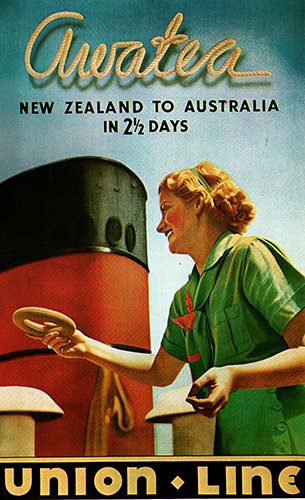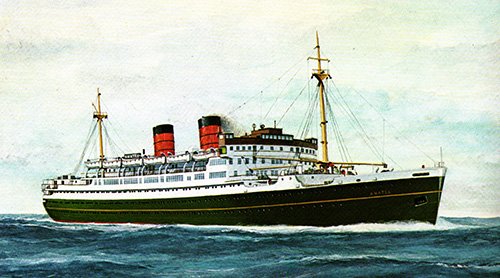
By Alex Porter (Ngā Taonga Sound & Vision)
A handful of crew on board the Union Steam Ship Company’s new trans-Tasman Liner, the Awatea, are interviewed prior to their arrival in Wellington on 3 September 1936.
Track 01:
Track 02:
Audio from the Ngā Taonga Sound & Vision Radio Collection, all rights reserved. To enquire about re-use follow this link.

Publicity poster promoting the Awatea. Courtesy of Cruising the Past.
The audio was preserved from two tracks of a 16” laquer disc housed in the Ngā Taonga Sound & Vision Radio Collection. The first includes a test radio telephone link made between an unidentified 2YA announcer (referred to as “Mr Announcer”), the telephone exchange and the shipping vessel located somewhere in the Pacific. The second continues contact with the effervescent Commander, Captain A.H. Davey, who briefly describes the voyage from the UK through the Panama Canal and Pacific – where they encountered a three hour electrical storm, much to his delight. Captain Davey introduces the Chief Engineer, Mr Lockeheart, and the Chief Steward, Mr Cooper, as questions are posed by “members of the travelling public” (an unidentified man, young boy and woman) also speaking from 2YA’s studios, Wellington. The Ship’s Wireless Operator, Mr Jones, and 2YA announcer conclude the interviews by exchanging information about the radio telephone procedure establishing their connection.

The Awatea. Courtesy of Cruising the Past.
The Awatea’s design exceeded expectations as she completed the journey from the UK to New Zealand in a record time of 28 days, fourteen hours and twenty minutes [1] and was later referred to as “The Queen of the Tasman Sea” [2], being the fastest of all the trans-Tasman liners. The superior (in speed and stability) steam turbine passenger and cargo liner was built by contractors Vickers-Armstrong Ltd. at Barrow-in-Furness, Cumbria, in the north-east of England over two years. On 25 February 1936 the Awatea was launched by the wife of the New Zealand Governor-General, Lady Elaine Bledisloe, before being fitted-out and trialled at sea. Unfortunately this dynamic ship had a relatively short lifespan and on 11 November 1942 the Awatea, meaning “Eye of the Dawn” [3], sadly sank at sundown after an attack by German bombers near the port of Bougie (Bejaia), east of Algiers. Many of the crew were wounded but all survived [4].
Sources:
[1] P&O Heritage